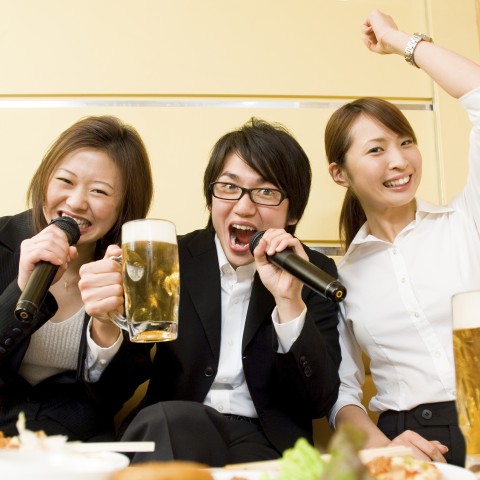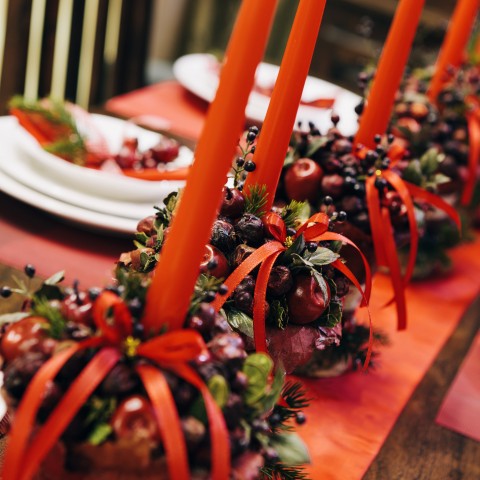Year-end parties in Japan, also called “drinking parties” or “Bonenkai parties,” are special celebrations held at the end of the year. Essentially, during a Japanese drinking party, people get together with food and alcohol, and honestly reflect on the past year with each other.
In this article, you’ll learn all about what to expect from a year-end party in Japan, as well as this celebration’s place in Japanese literature.
At JapanesePod101.com, we aim to make every aspect of your language-learning journey both fun and informative—starting with this article!
Let’s go.
1. What is a Year-End Party?
So, what is Bonenkai in Japan, and why is it important?
A 忘年会 (ぼうねんかい), or “year-end party,” is a banquet held at the end of each year in order to forget the troubles and hard times of the year. Well, perhaps rather than saying “forget,” it’s more like “Letting bygones be bygones” or “Resetting ourselves for the coming New Year.” It’s a dinner held not with feelings of regret for the past, but with feelings of motivation to start afresh and do one’s best in the future.
2. When to Expect a Japanese End-of-Year Party
Year-end parties are held throughout Japan on different dates, usually starting in early December up until the New Year.
3. Bonenkai Parties: Traditions and Customs
For a year-end party, Japanese people host business year-end parties on 仕事納め (しごとおさめ), or “the last business day of the year,” in which work colleagues get together, as well as private year-end parties in which friends and private groups get together. In either case, the Japanese spend December pleasantly eating and drinking while looking back at the events of the year.
When looking back at the year, it’s natural to look back not only at what was good and brought happiness, but also to remember the hard times and things that didn’t quite work out. At year-end parties, it’s important that all participants share the feeling that while many things happened this year, they will continue to do their best in the New Year. People renew their vitality for work and social circles for the coming New Year.
From November onwards, the storefronts of pubs and other year-end party venues are adorned with posters saying, “We host year-end parties.” Additionally, websites and gourmet magazines put together special year-end party editions. For restaurants, the year-end party season is a prosperous time of year for business.
As suggested by the coined word “alcommunication” from “communication,” the Japanese prefer to strengthen their relationships while eating delicious food and drinking alcohol. It’s for this reason that they hold year-end parties throughout the country. The Japanese also view these parties as a 無礼講 (ぶれいこう), or “abandonment of normal social formalities.”
4. Mentions of the Year-End Party in Japanese Literature
The oldest literature that contains references to year-end parties is thought to have come from the Muromachi period of the 14th and 15th centuries. It mentions holding a party and drinking after poetry recitals held at the end of the year.
In which famous novel of the Meiji period does the phrase “year-end party” appear?
The correct answer is I Am a Cat by Sōseki Natsume. In it, he wrote that there is a year-end party and concert at the home of an acquaintance of Mukōjima, with the word “year-end party” notably being used without annotation. From this, it’s believed that year-end parties were quite commonplace in the Meiji era, the time in which Sōseki was alive.
5. Must-Know Vocabulary for Year-End Parties
Here’s some Japanese vocabulary you need to know for the year-end parties!
- カラオケ (カラオケ) — karaoke
- 忘年会 (ぼうねんかい) — year-end party
- 居酒屋 (いざかや) — izakaya
- 乾杯 (かんぱい) — cheers
- 飲み放題 (のみほうだい) — all-you-can-drink
- 宴会 (えんかい) — banquet
- 仕事納め (しごとおさめ) — the last business day of the year
- 幹事 (かんじ) — party organizer
- 貸し切り (かしきり) — charter
- ドンチャン騒ぎ (ドンチャンさわぎ) — boisterous merrymaking
- 無礼講 (ぶれいこう) — abandonment of normal social formalities
- パーティールーム (パーティールーム) — party room
To hear each of these vocabulary words pronounced, and to read them alongside relevant images, be sure to check out our Japanese Year-End Party vocabulary list!
Final Thoughts
What are your thoughts on the Japanese year-end parties? Are any of the celebrations similar to New Year celebrations in your own country? Let us know in the comments!
If you’re interested in learning more about Japanese culture, or want to learn some more wintery words, you may find the following pages interesting:
- Japanese Culture
- Top 5 Pop Culture Things/Icons You Need to Know About Japan
- Japanese Hand Gestures and Body Language
- Words for Winter Snow Days
- Top 10 New Year’s Resolutions
Learning Japanese doesn’t have to be boring or overwhelming. With JapanesePod101.com, it can even be fun! If you’re serious about mastering the language, create your free lifetime account today.
Happy Japanese learning, and have a Happy New Year!













